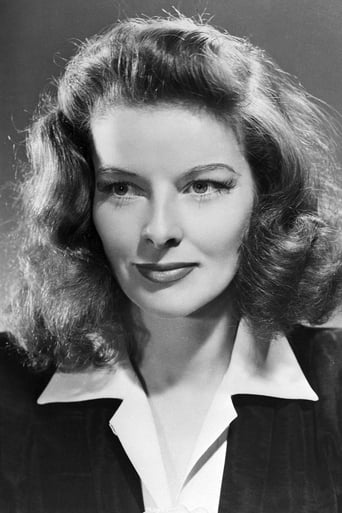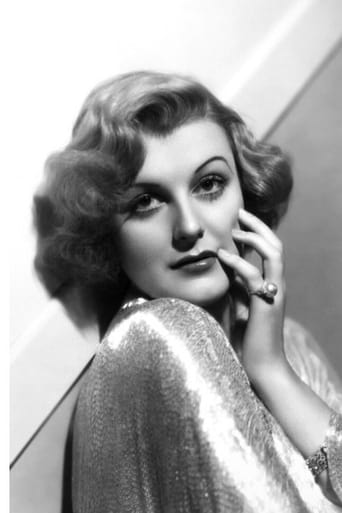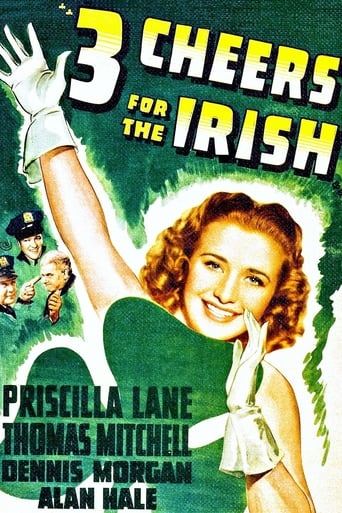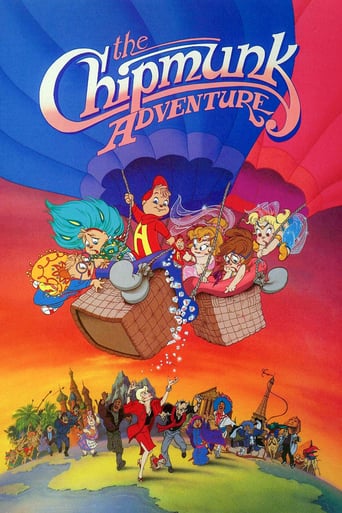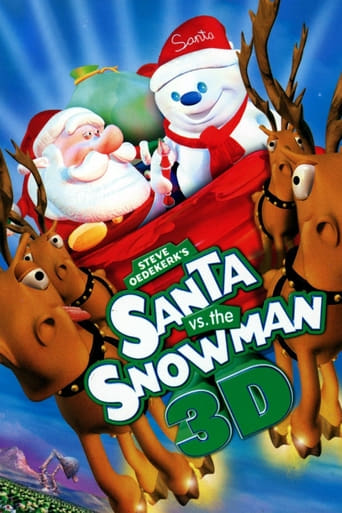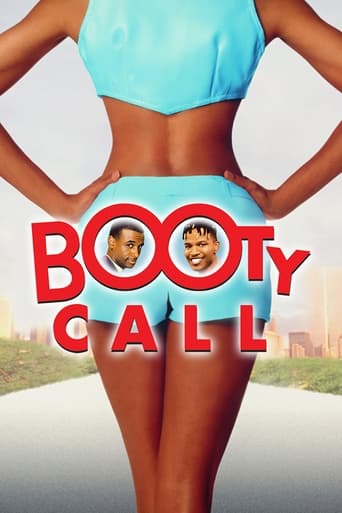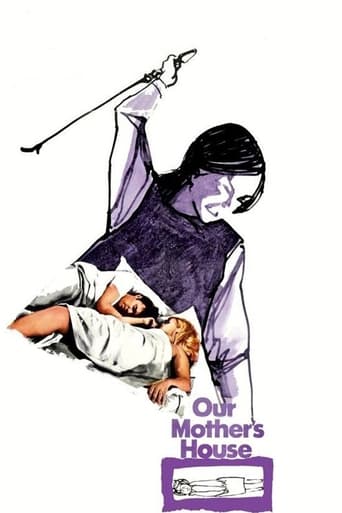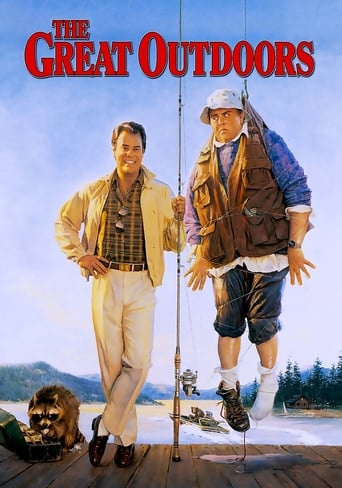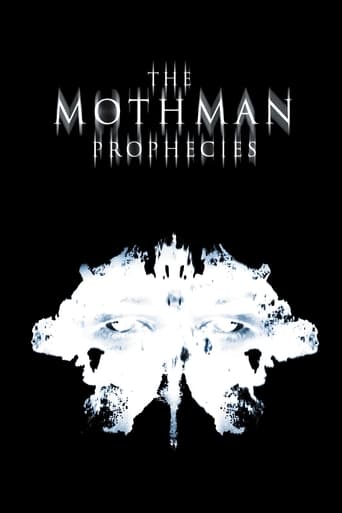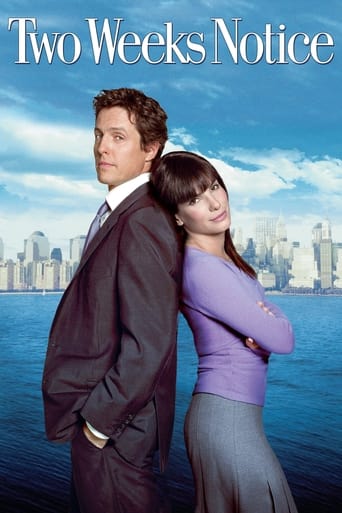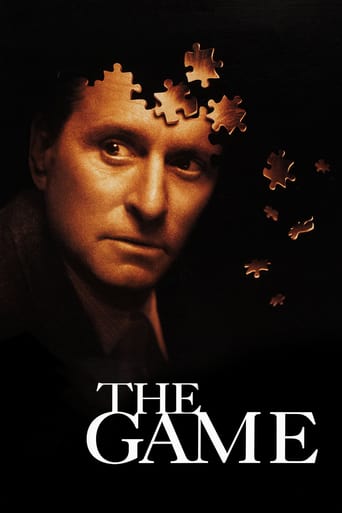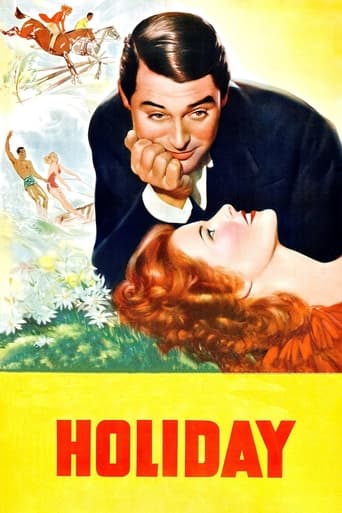
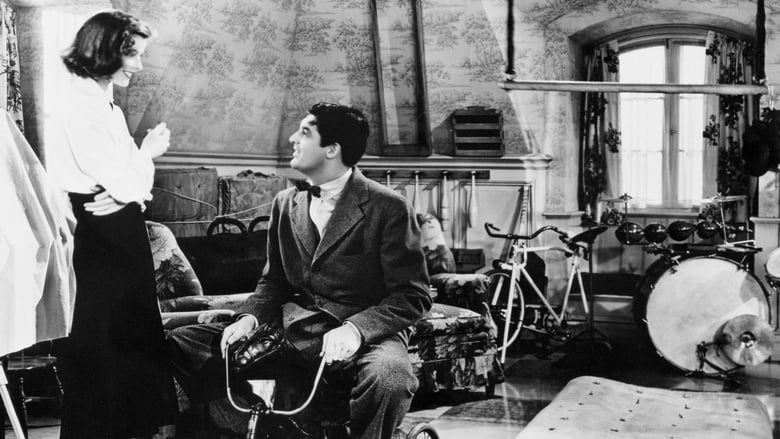
Holiday (1938)
Johnny Case, a freethinking financier, has finally found the girl of his dreams — Julia Seton, the spoiled daughter of a socially prominent millionaire — and she's agreed to marry him. But when Johnny plans a holiday for the two to enjoy life while they are still young, his fiancée has other plans & that is for Johnny to work in her father's bank!
Watch Trailer
Cast
Similar titles
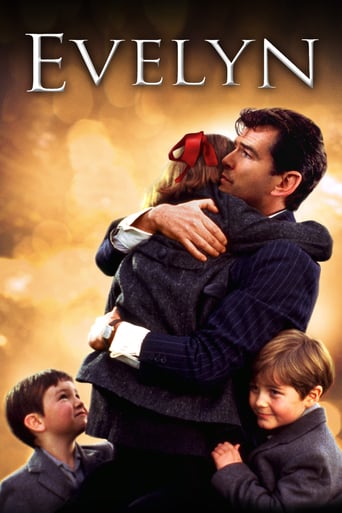
Reviews
Overrated and overhyped
An absolute waste of money
I enjoyed watching this film and would recommend other to give it a try , (as I am) but this movie, although enjoyable to watch due to the better than average acting fails to add anything new to its storyline that is all too familiar to these types of movies.
It’s sentimental, ridiculously long and only occasionally funny
HOLIDAY (Columbia, 1938), directed by George Cukor, from the 1928 stage play by Philip Barry, is an updated comedy with serious overtones that marked the third screen collaboration of Katharine Hepburn and Cary Grant. While there are those who'd rather ignore their initial pairing of SYLVIA SCARLETT (RKO, 1935), in favor of the fast-paced/ madcap comedy of BRINGING UP BABY (1938), HOLIDAY, which immediately followed, offers both sophistication and originality, in spite the fact that the story had been filmed eight years earlier (Pathe, 1930)starring Ann Harding (Linda), Mary Astor (Julia), Robert Ames (John) and Monroe Owsley (Ned). The advantage both films have is the delightful presence of character actor Edward Everett Horton playing Nick Potter in both versions. For this edition, HOLIDAY, both Hepburn and Grant are at their finest.Set in New York City during both the Christmas and New Year's holidays, the narrative opens with 30-year-old Johnny Case (Cary Grant), returning from his skiing vacation in Lake Placid by taxi. He first stops over the apartment of his very best friends, Nick (Edward Everett Horton), a college professor, and his wife, Susan (Jean Dixon), with the news that he's met and now engaged to a girl he's met during his holiday, and will be married in ten days. This is followed by his visit to the home of his fiancé, Julia Seton (Doris Nolan) where he's to meet and acquaint himself with her family. To his surprise, Johnny finds Susan a debutante living in a Park Avenue mansion with stairways and elevators big enough to pass as a museum. During the course of the story, Johnny is introduced to Julia's brother, Ned (Lew Ayres), an unhappy individual who drowns his sorrows with alcoholic drinks; her sister, Linda (Katharine Hepburn), a carefree heiress who takes an immediate like towards the equally carefree Johnny; and her father, Edward Seton (Henry Kolker), a serious-minded banker whose business comes ahead if his family. He is both stunned and appalled after being told by Susan during his attendance in church of her engagement, and now intends to learn more about this young man. Linda, a "black sheep" of the family with sentimental memories of her late mother, yearns the love and affection from her father. She finds comfort in the family playroom on the fourth floor that was formerly her mother's place for escape. After the New Year's Eve engagement party for which Linda chooses not to attend, the Seton family is appalled to learn that Johnny, having worked since he was ten, has his own philosophy to enjoy life first by retiring young and going back to work after comprehending the reason for working in the first place. While Linda sides with his right to be free and happy while still young to enjoy life, both Julia and her father have other means of persuading Johnny to think as they do. Also appearing in the cast are Henry Daniell (Seton Cram, Julia's cousin); Binnie Barnes (Laura Cram, Seton's wife) Bess Flowers, Matt McHugh and Neil Fitzgerald, among others. The direction of George Cukor translates Donald Ogden Stewart's screenplay into a well produced production. Not a laugh-out-loud comedy, but a pleasant 93 minutes. Of those in the Seton family, Lew Ayres, shortly before achieving success in the "Doctor Kildare" film series (1938-1942) for MGM, wins both sympathy and honors for his realistic approach of a unhappy single man unable to fulfill his life's ambition as both drummer and composer of the "Seton Concert," now tied down to his strict father's idea of family tradition in the business world. Hepburn's Linda, the stronger of the siblings, a misunderstood member of the family, would rather lose her father's love than her the self-respect lost to her brother, Ned. Doris Nolan, who at times resembles Joan Fontaine through her profile and Fontaine hairstyle of the day, best described as "sweet and intelligent" who, in actuality, to be more like her father than her free-spirited sister. Amusing highlights include Grant's backward flip-flops to express happiness, Horton and Dixon's mini puppet show, and Hepburn's expertise in handling her character to resemble that of her personal self. She and Grant make a grand team, and it shows how much they commend each other with their scenes. Hepburn and Grant would team one more time in another screen adaptation of Philip Barry's based play to THE PHILADELPHIA STORY (MGM, 1940), shortly before Kate would win immortality with her much better known screen partner of Spencer Tracy in nine feature films during the course of 25 years.Due to the fact that HOLIDAY was formerly broadcast on commercial television often during the Christmas season, for some reason it's seldom listed as a "holiday" movie, hence the title. Aside from early distribution onto video cassette in the 1980s, and decades later on DVD, cable television broadcasts have varied, but commonly found on Turner Classic Movies where it been airing since its humble beginnings dating back to 1994. (****)
Johnny Case (Cary Grant) is on cloud nine as he tells his friends the Potters that he's marrying Julia Seton (Doris Nolan). Only he doesn't know that she's the daughter in a wealthy family. She wants him incorporated into her money-making family. Her older black sheep sister Linda (Katharine Hepburn) loves his carefree attitude. Her loving mother passed away and her father is a hard man. Her brother Ned was a musician but her father puts him to work in a life that he hates.Cary Grant and Katharine Hepburn have superior charisma and terrific chemistry together. That's all the film needs and all that any viewer needs to know. The characters are fast-talking fun with some slapstick thrown in. They learn to follow their dreams and their hearts rather than follow their family obligations. Grant is always a great every man and it's important that he's not a slacker. He is the new self-made man not encumbered by money while Hepburn is the liberated woman.
Holiday is my favourite Cary Grant film and my favourite of Cary Grant & Katharine Hepburn's partnership. Between this, Bringing Up Baby and The Philadelphia Story it's almost like having to choose my favourite child; yes all three are that good but ultimately Holiday is the most beloved of my offspring. I find Kate & Cary to be one of the five greatest instances of chemistry I've seen between an actor and actress (my other selections being Astaire & Rogers, Powell & Loy, Stewart & Sullivan and Fonda & Stanwyck), even preferring them to the longer running Tracy-Hepburn partnership.However, the two stars aren't actually romantically engaged throughout Holiday, with Johnny Case (Grant) preparing to get married to Julia Seaton (Doris Nolan), the sister of Linda Seaton (Hepburn). This dynamic in which Linda is more passionate about her sister's relationship than Julia herself and the obvious feelings she has for Johnny is a much more interesting and complex dynamic than the more standard romance. Linda is far more interesting than her comparably dull sister. The whole time I'm thinking to myself Kate & Cary are beyond perfect for each other in this coming together of two intellectuals. - I simply don't want to see them being involved with anyone else.I feel Cary Grant has never looked more youthful than he does in Holiday and even gets a rare opportunity to show off his acrobatic skills, with Hepburn even getting in on the action. I'll also take this opportunity to mention that man sure could wear clothes like no other. The discussions Kate & Cary engage on what their characters want to do with their lives are so deep and profound. The difficulty of finding their place in life, the obstacles of trying to live it and not wanting to miss out on an ever-changing world full of ideologies and ideas, all while trying to get by with an optimistic attitude despite the imperfections in their life. It's hard to take it all in on and decipher in a single viewing, which makes Holiday one of my most life-affirming movies.Katharine Hepburn, on the other hand, had the opportunity in her career to play roles which reflected her real-life personality as a non-conformist oddball. In Holiday she is the the black sheep in a wealthy, business-driven family. Linda is a character who comes up with what her family describes as "little ideas" which they outright dismiss. Her "little idea" of throwing an engagement party for Julia in their childhood playroom (a playroom which looks so much fun! You could almost set the entire movie in there) on New Year's Eve is one of the most powerful and harrowing moments I've seen in any film. The feeling of being an outsider and a lonely at that (I know I've been there before) has never been captured more effectively on celluloid than it has when Cary Grant and Katharine Hepburn are dancing alone in the playroom and welcome in the New Year. I do make it an aim during a future new year's eve to watch Holiday with the film synchronized with real time so I can introduce the new year at the exact same time the character's in the movie do so.
Everything that "The Philadelphia Story" was, "Holiday" wasn't.If the point of Holiday's story was to convince me that the incredibly rich were just a bunch of boring, stuffy, petty, snivelling, tantrum-throwing, one-dimensional goofs (Yeah. That about covers it), then, yes, it certainly achieved its intended goal quite successfully.Holiday is a prefect example of why I generally detest and often avoid watching "Screwball" comedies from the 1930s and 40s.Its story was so contrived, predictable and riddled with every "poor-little-rich-girl" cliché in the book that it made my skin absolutely crawl in complete revulsion to everything that it supposedly stood for.One aspect of Holiday's "far-from-believable" story that really killed me had to do with the 3 spoiled-brat children (who were all around the age of 30) of wealthy banker, Edward Seton.These 3 big sucks clearly resented "daddy-dearest" for the dominating and (apparent) strangle-hold that he had on their lives. Yet these 3 little whining cry-babies continued to live under the same roof with this overbearing, money-grubbing, Wall Street monster. And that, to me, rendered them all a bunch of selfish, temperamental, hypocritical wimps as they greedily guzzled down his booze and paraded around in all of their tres' chic, designer outfits.Holiday was the sort of film whose story really sent out a very confused and mixed message about the super-wealthy set. It just couldn't decide whether it wanted the viewer to laugh at them, or to hate them, or to enviously desire to be just like them. But, whatever - This film's story was "Screwball" comedy at its absolute most detestable, in my opinion.And, besides all of that nonsense, I definitely thought that the chemistry between its 2 big-name stars, Katharine Hepburn and Cary Grant, stank, big-time. And that's because there really was no chemistry between these 2, whatsoever.Of the 4 principal characters who dominated Holiday's story, it was Cary Grant's "I-just-wanna-bum-around-for-the-rest-of-my-life" role as John Case who rang the most false and pretentious.Immaculately groomed in his tailor-made suites and shiny shoes, I wasn't convinced, for even a minute, that this "good egg" wasn't even phased one bit by the possibilities available to him through all of Seton's financial wealth. To me, Case's phony, non-materialistic philosophy didn't hide the fact that beneath his apparent selfless intentions lurked a greedy, little gold-digger just waiting to pounce on all that dough.
